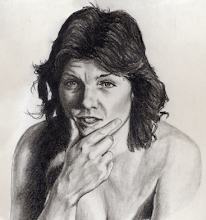Maybe he’s like John Wayne, in a sense, because it’s true I had the very same feelings about that American icon. It didn’t bother me with the cowboy, though – probably because Mr. Wayne always played the cowboy and what they called him in the script didn’t matter at all (Who remembers anyway? McClintock is the only character name that comes to my mind at the moment and I’ve seen every one of his westerns). And, I met John Wayne when I was young and he was exactly as I thought he would be. When he said to me in that very familiar drawl, “How ya doin’ little missy” I knew I was standing next to The Duke.
Maybe I’m more comfortable with the essence of a western cow-hand than the perceived snobbish ways of an east coast elitist? Even when Affleck played a non-elitist, as in his roles in Dazed & Confused
First, I watched Hollywoodland
It wasn’t. What charisma Mr. Reeves had did not shine through in Affleck's performance and I just didn’t believe him as the Adventures of Superman actor. If I were friend or family of the original star I do believe I would hate the film just because of the lack of personalty given to Reeves. Otherwise, though, the film wasn’t half bad. Historically it covered a lot of bases and does give the most notable possibilities regarding what happened the night of Reeves’ death. It lessened the evidence that points to murder, and amplified aspects that lean toward suicide and I found that a little unfortunate. There are missing clues that are worth researching after you watch the film, if you have a mind to dig a little further.
As for Affleck's performance, he did receive some pretty good reviews but I think most critics simply emphasized with Ben the actor. Many of them draw a parallel between the two stars, who both struggled tirelessly to overcome the doldrums of a not so exciting acting career. With Reeves, he was a descent film actor stuck in a less than respectable TV star persona, and a relationship with a powerful and married woman. With Affleck he’s a descent looking guy stuck with the morphed nickname Bennifer simply because the world-wide-gossip-media found way too much interest in his relationship with Jennifer Lopez. In a strange sort of way, the two had something in common. At least according to a lot of critics.
A couple of inaccuracies within the film are worth shedding a little light upon. One, audience derision and heckling towards Reeves at a test screening for From Here to Eternity
And two, on the night he died, all three scenarios imagined by a private detective showed George playing his guitar and singing ‘Aquellos Ojos Verdes’ in Spanish and off-key. George, as were all Hollywood contract players in that era, was well trained in singing and never would have been off-key; and Leonore Lemmon (George’s girlfriend and fiance at the time) said before she died in 1989, that George never came down from his bedroom that night at all. That scene did nothing more than make George look pitiful, which was far from what he actually was.
 |
| George Reeves and Leonore Lemmon |
Meanwhile, Diane Lane (who played Toni Mannix, George’s married mistress) nearly stole the show with her predatory way, speaking with a hauntingly forced yet not over played Hollywood accent, and gracefully expressed herself with a refined and manicured demeanor. The essence of movie making in the 1950s was quite strong and I enjoyed the sets, props, clothing, and stylish film-making. Visually, it is a wonderful film to experience.
So, here I am recommending a Ben Affleck movie, not because of his performance at all, but because other players did a marvelous job stealing the show from the star. More than that, George Reeves is one we should learn a little more about. He is another of those Hollywood tragedies that seems to be buried back there, somewhere, and it feels to me that he’s never really been given a fair shake.
In the coming second half of this two for one, I’ll explore the east-coat elite side of Affleck by comparing him with none other than Russell Crowe.









